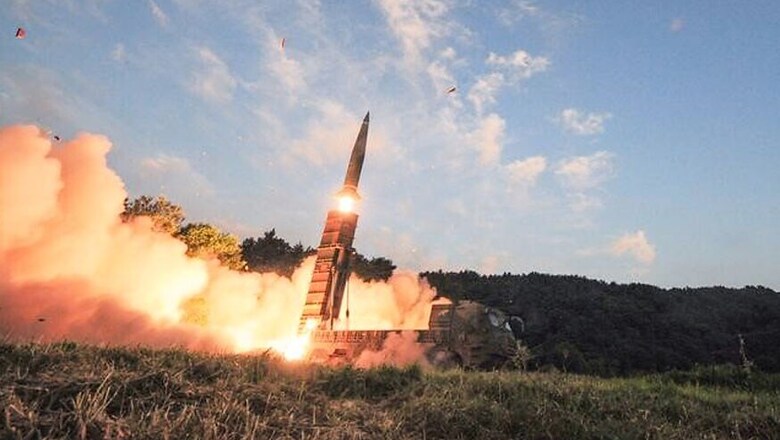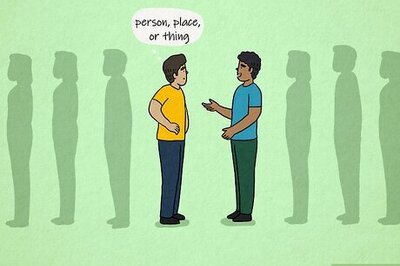
views
Seoul: South Korea said on Monday it was preparing fresh military drills with its ally the United States and ramping up its ballistic missile defences in response to North Korea's sixth and most powerful nuclear test a day earlier.
The United Nations Security Council was set to meet later on Monday to discuss fresh sanctions against the isolated regime. US President Donald Trump had also asked to be briefed on all available military options, according to his defence chief.
Officials said activity around missile launch sites suggested North Korea planned further provocations.
"We have continued to see signs of possibly more ballistic missile launches. We also forecast North Korea could fire an intercontinental ballistic missile," Chang Kyung-soo, a defence ministry official, told a parliament hearing on Monday.
South Korea's defence ministry also said it would temporarily deploy the four remaining launchers for a major new US missile defence system after the completion of an environmental assessment by the government.
The rollout of the controversial Terminal High Altitude Area Defense (THAAD) system, vehemently opposed by neighbouring China, had been delayed since June.
South Korea's air force and army conducted exercises involving long-range air-to-surface and ballistic missiles on Monday following Sunday's nuclear test, the joint chiefs of staff said in a statement. More drills were being prepared with US forces in the South, it said.
TOUGH TALK
North Korea said an advanced hydrogen bomb for a long-range missile was tested on Sunday, prompting the warning of a "massive" military response from the United States if it or its allies were threatened.
"We are not looking to the total annihilation of a country, namely North Korea," US Defense Secretary Jim Mattis said after meeting Trump and his national security team. "But as I said, we have many options to do so."
Trump has previously vowed to stop North Korea developing nuclear weapons and said he would unleash "fire and fury" if it threatened US territory. That prompted the North to threaten to fire missiles towards the US Pacific territory of Guam, although it has since appeared to back away from that threat.
Despite the tough talk, the immediate focus of the international response was expected to be on tougher economic sanctions against Pyongyang.
Diplomats have said the UN Security Council could now consider banning Pyongyang's textile exports and the North's national airline, stop supplies of oil to the government and military, prevent North Koreans from working abroad and add top officials to a blacklist to subject them to an asset freeze and travel ban.
South Korean President Moon Jae-in and Japanese Prime Minister Shinzo Abe agreed on Monday to pursue stronger UN sanctions.
"Both heads of state agreed to cooperate closely with each other and the United States and shared the understanding there must be the most powerful sanctions and pressure applied on North Korea," presidential Blue House spokesman Park Su-hyun told a media briefing after the two leaders spoke by phone.
The aim of stronger sanctions was to draw North Korea into dialogue, he said.
In a series of tweets on Sunday, Trump appeared to rebuke South Korea for that approach.
"South Korea is finding, as I have told them, that their talk of appeasement with North Korea will not work, they only understand one thing!" Trump said on Twitter.
Still, Trump's response was more orderly and less haphazard than he had offered to other provocations by North Korea.
His handling of Pyongyang's latest nuclear test reflected a more traditional approach to crisis management, which US officials said illustrated the influence of Mattis and new White House chief of staff, retired Marine Corps General John Kelly.
MARKETS CAUTIOUS
Japanese and South Korean stock markets were both down modestly on Monday, while safe haven assets including gold and sovereign bonds ticked higher, but trade was cautious.
"Assuming the worst on the Korean peninsula has not proven to be a winning trading strategy this year," said Sean Callow, a senior foreign exchange strategist at Westpac Bank. "Investors seem reluctant to price in anything more severe than trade sanctions, and the absence of another 'fire and fury' Trump tweet has helped encourage markets to respond warily."
South Korea's finance minister vowed to support financial markets if instability caused by the latest test showed signs of spreading to the real economy.
"We are aware that there could be negative ripple effects should geopolitical risks resurface," Kim Dong-yeon told a hastily arranged policy meeting with the central bank and financial regulators before financial markets opened.
WRONG ACTIONS
North Korea, which carries out its nuclear and missile programmes in defiance of UN resolutions and sanctions, said on state television the hydrogen bomb test ordered by leader Kim Jong Un had been a "perfect success".
Hours before, North Korean state news agency KCNA released pictures showing Kim inspecting a silver, hourglass-shaped warhead during a visit to the North's nuclear weapons institute.
Sunday's test had registered with international seismic agencies as a man-made earthquake near a test site. Japanese and South Korean officials said the tremor was about 10 times more powerful than the one picked up after North Korea's previous nuclear test a year ago.
China's National Nuclear Safety Administration said data from radiation monitoring stations near the North Korean border showed no impact on "China's environment or populace".
China's Foreign Ministry said Pyongyang was clear about Beijing's opposition to North Korea's nuclear test and reiterated that talks were needed to resolve the issues on the Korean peninsula.
Australian Prime Minister Malcolm Turnbull said that, while North Korea was not a puppet state of China, Beijing needed to do more to pressure its neighbour.
"The Chinese are frustrated and dismayed by North Korea's conduct, but China has the greatest leverage, and with the greatest leverage comes the greatest responsibility," he told the Australian Broadcasting Corp on Monday.
Pyongyang tested two ICBMs in July that could potentially fly about 10,000 km (6,200 miles), putting many parts of the US mainland within range and prompting a new round of tougher international sanctions.




















Comments
0 comment